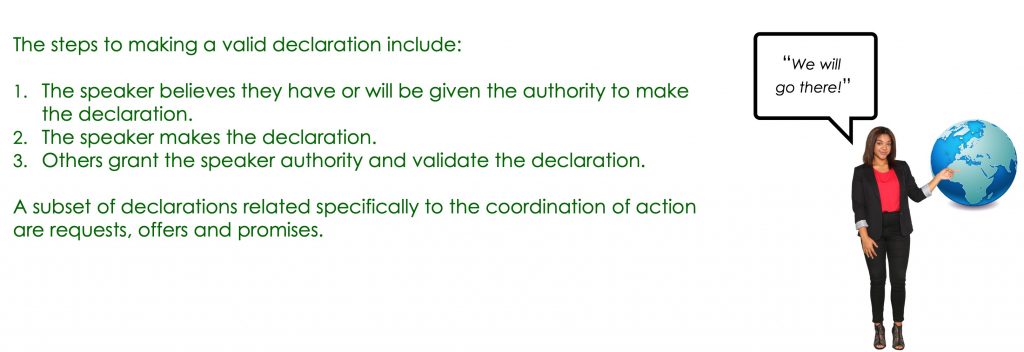
| Addresses: | What we/I will do |
| Involves: | Declaration |
| Purpose: | Commit to what to do – outcome and actions |
| Desired Outcome: | Valid declaration |
| Optimal Mood: | Ambition |
At the end of an effective speculative conversation, ideally there are one or a few viable options that would resolve the breakdown. There can be no progress from this point until someone decides what specific actions will be taken to address the breakdown.
A decision is an aspect of the linguistic act known as a declaration. Declarations define the future as the speaker wants it to be. A valid declaration means that others give authority to the speaker such that they will accept that declaration as part of their future.
As a valid declaration of action is critical to the successful resolution of a breakdown, early identification of who can make that declaration is important. This may be us but is often someone else. Early identification of the individual(s) with authority allows for:
- An inclusion of that person in the conversations as early as possible;
- An understanding of what concerns are important to that person and the criteria on which they will base their decision;
- A more constructive and cooperative approach to the conversations;
- A more efficient conversational process as conversations will not need to be revisited as much as might be the case if the decision maker is not involved.
If this is a private conversation about a personal breakdown then the declaration of action lies with us. However this doesn’t automatically mean we give ourselves the authority to make that decision. We can make half-hearted declarations or even avoid making a declaration altogether. This will show up in our language and how we feel. We may think of merely trying to do something or feel anxious about the outcome. If we do not feel fully committed to our decision then it is less likely we will follow through on our declaration or generate the outcomes we seek. This may also feed back into our self-story and not in a good way.
If it is a public conversation and others expect us to make the declaration of action, then they will listen to the authority behind our words. They will interpret how much this declaration means to us and, therefore, what it might mean to them. They will listen to what priority to give this declaration and whether the speaker really means it and will follow through. These interpretations will inform the actions they will take in response. For instance, if someone says “we will try to…” then that may well be interpreted as half-hearted and that the speaker doesn’t really believe it is achievable. Beyond the particular situation, the speaker’s trustworthiness and identity for others will be informed by manner and type of their declarations. This is one of the basic dynamics of our relationships.
As relationships progress, those involved tend to fall into habitual stories and patterns of how to relate to each other. In dealing with breakdowns, it is common to simply fall into those patterns and give little thought to who is the most appropriate decision maker thereby reinforcing the pattern. A way of enhancing our relationships is pay more attention to who is the most appropriate person to make a decision. This will be explored further in the document on ‘Relationships’.
A declaration of action establishes the path to addressing the breakdown. This may require the involvement of other people and for that an ‘action conversation’ is required.
